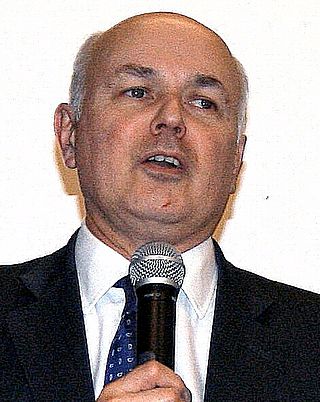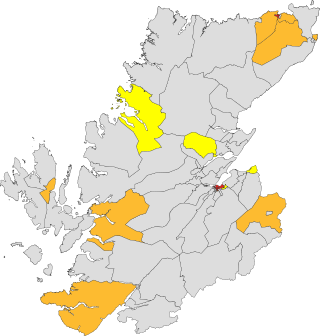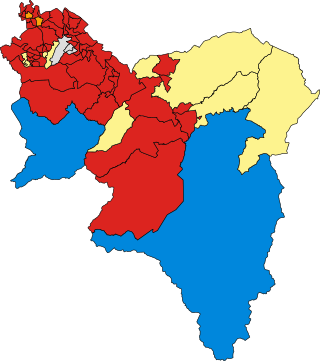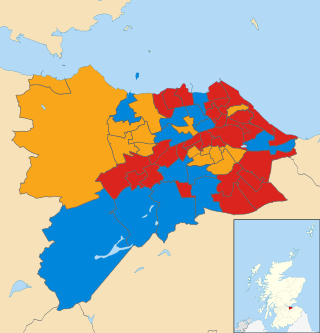
The 2003 Scottish Parliament election was the second election of members to the Scottish Parliament. It was held on 1 May 2003 and it brought no change in terms of control of the Scottish Executive. Jack McConnell, the Labour Party MSP, remained in office as First Minister for a second term and the Executive continued as a Labour and Liberal Democrat coalition. As of 2023, it remains the last Scottish Parliament election victory for the Scottish Labour Party, and the last time the Scottish National Party lost a Holyrood election.

The 2003 United Kingdom local elections were held on Thursday 1 May 2003, the same day as the Scottish Parliamentary and the Welsh Assembly elections. There were local elections for all councils in Scotland and in most of England. There were no local elections in Wales, Northern Ireland or London.

The 2007 United Kingdom local elections were held on Thursday 3 May 2007. These elections took place in most of England and all of Scotland. There were no local government elections in Wales though the Welsh Assembly had a general election on the same day. There were no local government elections in Northern Ireland. Just over half of English councils and almost all the Scottish councils began the counts on Friday, rather than Thursday night, because of more complex arrangements regarding postal votes.

The 2007 Scottish local elections were held on 3 May 2007, the same day as Scottish Parliament elections and local elections in parts of England. All 32 Scottish councils had all their seats up for election – all Scottish councils are unitary authorities.

Elections to Aberdeenshire Council were held on 3 May 2007 the same day as the other Scottish local government elections and the Scottish Parliament general election. The election was the first one using 19 new wards created as a result of the Local Governance (Scotland) Act 2004, each ward would elect three or four councillors using the single transferable vote system form of proportional representation. The new wards replaced 68 single-member wards which used the plurality system of election.
Elections to The Moray Council were held on 3 May 2007, the same day as the Scottish Parliament election. The election was the first using the eight new wards created under the Local Governance (Scotland) Act 2004. 26 councillors were elected. Each ward elected either 3 or 4 members, using the STV electoral system. Previously there were single-member wards which used the first past the post electoral system.

Elections to the Highland Council were held on 1 May 2003; the same day as elections to the Scottish Parliament and to the 31 other councils in Scotland. 80 councillors were elected from 80 wards using the plurality system. Independent councillors retained their status as the majority group, with councillors also being elected representing the Labour Party, Liberal Democrats, and Scottish National Party.

Elections to South Lanarkshire Council were held on 1 May 2003, the same day as the 31 other local government elections in Scotland and elections to the Scottish Parliament. This was the third election since the council's creation in 1995 and the last election to use first-past-the-post voting.

Elections to Glasgow City Council were held on 1 May 2003, the same day as the other Scottish local government elections and the Scottish Parliament general election.

The 2003 Scottish local elections were held on 1 May 2003, the same day as Scottish Parliament elections and local elections in parts of England. All 32 Scottish councils had all their seats up for election – all Scottish councils are unitary authorities.
Elections to East Ayrshire Council were held on 1 May 2003, the same day as the 31 other local government elections in Scotland and elections to the Scottish Parliament. This was the third election since the council's creation in 1995 and the last election to use first-past-the-post voting.

Elections to the City of Edinburgh Council were held on 1 May 2003, the same day as the other Scottish local government elections and the Scottish Parliament general election.

2003 Elections to Fife Council were held on 1 May 2003, the same day as the other Scottish local government elections and the Scottish Parliament election. The election was the last one to use plurality system of election to elected the 78 individual councillors.

The 2003 elections to Argyll and Bute Council were held on the 1 May 2003 and were the third for the unitary authority, which was created under the Local Government etc (Scotland) Act 1994 and replaced the previous two-tier system of local government under Strathclyde Regional Council and Dumbarton and Argyll & Bute District Councils. It was held on the same day as the second Scottish Parliament election and resulted in no change to the administration of the council - independent control. These were the last elections to the council using the first past the post electoral system.

Elections to Midlothian Council were held on 1 May 2003, the same day as the other Scottish local government elections and the Scottish Parliament general election. The election was the last one using the 18 single-member wards using the plurality system of election.

Elections to Renfrewshire Council were held on 1 May 2003, the same day as the other Scottish local government elections and the Scottish Parliament general election. The election was the last one using the 40 single-member wards using the plurality system of election.

Elections to Angus Council were held on 1 May 2003, the same day as the other Scottish local government elections.
Elections to the Moray Council were held on 1 May 2003, the same day as the other Scottish local government elections and the Scottish Parliament general election. This was the last election to use the first-past-the-post voting system across 26 single member wards.

The City of Glasgow is divided into a number of wards. These electoral districts, as they are also known, are used to elect councillors to Glasgow City Council. The council, composed of the elected members from each ward, provides local government services to the City of Glasgow.
Elections to Perth and Kinross Council were held on 1 May 2003, the same day as other Scottish Local Government elections and the Scottish Parliament Election.
















